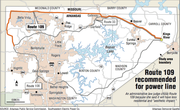An administrative law judge with the Arkansas Public Service Commission has approved a plan to construct a high-voltage transmission line through Benton and Carroll counties, and opponents of the project have begun planning an appeal.
Judge Connie Griffin recommended a 56-mile route that skirts just north of the Missouri state line for about 25 miles, which will require regulatory approval in Missouri.
In her 118-page order, Griffin noted that the northernmost Route 109 wasn’t the shortest and wasn’t the one preferred by Southwest Electric Power Co. But Route 109 is the more “reasonable” choice because it would have less residential and “aesthetic impact,” she wrote.
“While Route 109 is longer, it crosses more undeveloped lands with larger parcels,” Griffin wrote. “As such, Route 109 has a lower residential proximity and visibility, crosses fewer parcels and fewer major roads.”
SWEPCO has yet to apply for approval from the Missouri Public Service Commission and must also apply to be a public utility in that state, officials have said. SWEPCO serves more than200 communities in Louisiana, Texas and western Arkansas, but none in Missouri, according to the company’s website.
“Since the administrative law judge has approved the northern alternate route, which includes segments in Missouri, we will start the process needed to complete the Missouri portion of the route,” Peter Main, a spokesman for SWEPCO, said Monday.
Griffin’s decision also must be considered by the Arkansas Public Service Commission. Anyone wishing to contest Griffin’s decision has 20 days from last Friday to object, said John Bethel, the commission’s chairman, who noted an objection would prompt a review by the three-member commission.
The commission has 30 days from last Friday to affirm the order, change it or reject it, said Bethel. The commission could decide to approve the proposal but pick a route different than any of the six originally under consideration, he said.
If the commission takes no action within 30 days, then Griffin’s order will go into effect as the commission’s own, Bethel said.
Opponents then would have another 30 days to petition for a rehearing. If a rehearing was denied or didn’t conclude in their favor, opponents could take their case to the Arkansas Court of Appeals.
A volunteer residents group called Save the Ozarks has opposed the transmission-line proposal from the beginning. The group asked Griffin to reject SWEPCO’s proposal on several grounds, including environmental issues and effect on tourism, particularly in the Eureka Springs area.
Pat Costner, director of Save the Ozarks, said it is taking the necessary steps to challenge Griffin’s ruling.
“If needed, we will appeal any adverse commission decision in court,” said Costner.
SWEPCO applied April 3 to build the 345-kilovolt transmission line from Centerton to the Kings River near Berryville. To support the line, six towers would be needed every mile averaging 130-160 feet tall, according to SWEPCO’s proposal. A 150-foot-wide right of way also would be required along the route.
The power-line proposal has generated thousands of comments from people opposed to the project who filed electronically or attended hearings in Eureka Springs and Rogers.
A week-long evidentiary hearing was held on the transmission line in August at the Public Service Commission office in Little Rock.
SWEPCO is required to build transmission projects within its service area if the Southwest Power Pool determines they are necessary, said David Matthews, the company’s attorney, during the Aug. 26 hearing in Little Rock. He said the line is needed to provide reliable electric service in the future to northern Arkansas and southern Missouri.
The pool is a regional transmission organization under the Federal Energy Regulatory Commission. It is responsible for planning electrical transmission needs for 6 million households in nine states.
American Electric Power Co. is the parent company of SWEPCO. Columbus, Ohio-based American Electric Power is one of the largest electric utilities in the U.S., serving more than 5 million customers in 11 states, according to the company’s website.
SWEPCO’s initial goal was to have the approval process and design engineering for the transmission line done by December. The company wanted construction to begin by March 2015 and the new line to be in service by June 2016.
Late Friday, Griffin granted a Certificate of Environmental Compatibility and Public Need to SWEPCO to construct and operate the line.
Three routes were still under consideration when Griffin made her ruling. Six were proposed initially, but three of those were eliminated in August because they went over an “undisturbed” part of Beaver Lake, and it would have been difficult to get an easement from the U.S. Army Corps of Engineers, Corps officials wrote in a July 10 letter to the commission.
At an estimated cost of $102.8 million, Route 109 is more expensive than SWEPCO’s preferred Route 33, which would be 49 miles and cost about $96.3 million to construct.
Route 33 went north of Eureka Springs, through Gateway and Garfield, then southwest between Bentonville and Bella Vista.
A third route, Route 108, was the longest and most expensive alternative at 59 miles and $117.4 million.
In addition to transmission-line costs, construction of the Kings River Station near Berryville is estimated at $20.4 million.
Arkansas, Pages 7 on 01/21/2014
